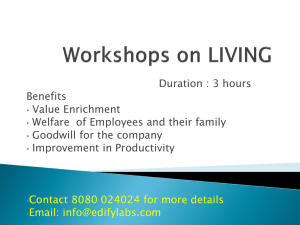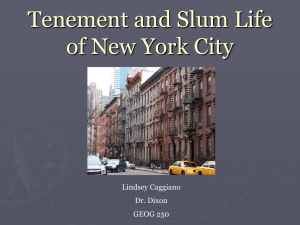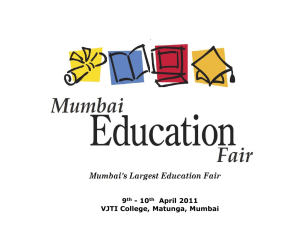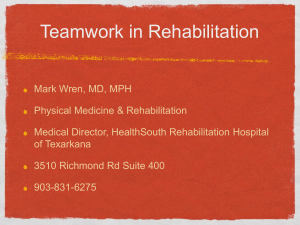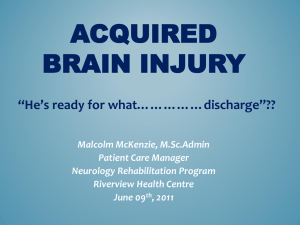BANDR-KURLA COMPLEX - Department of Administrative Reforms
advertisement
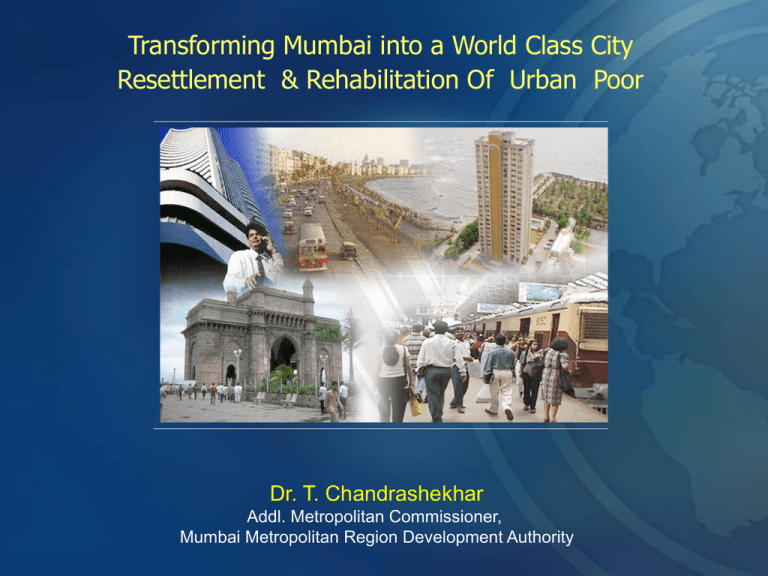
Transforming Mumbai into a World Class City Resettlement & Rehabilitation Of Urban Poor Dr. T. Chandrashekhar Addl. Metropolitan Commissioner, Mumbai Metropolitan Region Development Authority Mumbai’s Vision “Transforming Mumbai into a world class city with a vibrant economy and globally comparable quality of life.” Importance Of Mumbai Commercial and financial capital of India Generates 5% of India’s GDP Contributes over 1/3rd of India’s tax revenues The two ports in Mumbai handle 1/3rd of the country’s total foreign trade Shares about 38% and 26% of international and domestic air traffic respectively Contributes over Rs. 40,000 crore p.a. as taxes to Central Government A very high rate of migration to Mumbai for employment MUMBAI contributes more than RS. 40,000 Crore annually to GoI Rs. thousand Crore p.a. 55 13 42 25 9 8 Customs Excise InCen- State Total come tral Less than 1% of revenue generated in Mumbai ploughed back into city Mumbai showing visible signs of decline Engine of economic growth of country is losing out to other cities. Overburdened Transport System Proliferation of slums especially in sites reserved for essential infrastructure Declining industrial and economic activities Encroachments surrounding the Airport leading to safety and security concerns Lack of affordable housing 15 Largest cities in the world, 2000-15 0 5,000,000 10,000,000 15,000,000 20,000,000 25,000,000 30,000,000 Tokyo Mumbai Dhaka São Paulo Delhi Mexico City New York Calcutta Karachi Lagos Los Angeles Shanghai Metro Manila Beijing Cairo 2015 2000 Population explosion adding pressure on existing infrastructure Suburbs 115.00 88.00 Population in Lakhs 67.50 49.60 Island city 35.00 38.99 33.26 32.85 31.74 30.90 28.00 14.00 1961 1971 1981 1991 2001 2011 Year Ever increasing vehicular growth choking the road corridors No. of vehicles registered in lacs 16.00 10.30 6.23 3.09 1.52 Mumbai - Mahim Junction 0.61 1961 1971 1981 1991 2001 2011E Year Government of Maharashtra Initiatives Formation of Task Force Preparation of Vision Mumbai Report Development of long term strategy covering Strategic Planning & Financing Economic Growth Physical Infrastructure Housing Social Infrastructure Governance Formation of Citizens Action Group Involvement of NGOs, Eminent Citizens, Industrialists 3 Key areas for Mumbai’s transformation Metro Rail MUTP I & II MUIP Western Freeway Mumbai Trans-Harbour Link 1 Transport infrastructure Civic infrastructure Housing Towards Slum Development a world-class Resettlement & Mumbai Rehabilitation of Slums Economic Growth 2nd international airport Augmentation of water supply Upgradation of drainage systems National Status to KEM Hospital Resettlement and Rehabilitation Present Scenario of Housing 55% live in slums and 65 lakhs people do not have permanent shelter (Approximately 3000 Slums pockets) Slums and Encroachments affecting vital public projects 12 lakhs houses needed to provide shelter to slum dwellers Land has become scarce. Vast tracts of lands are locked up due to CRZ regulations and salt pan leases. Thousands of buildings are in dilapidated conditions endangering the lives of lakhs of people Infrastructure projects undertaken by GoM To improve the transport infrastructure including rail, road and public transportation the GoI, GoM & MMRDA have undertaken Mumbai Urban Transport Project Mumbai Urban Infrastructure Project Metro Rail Western Freeway Eastern Freeway Mumbai Trans Harbor Link Slums affected by Vital Infrastructure Projects Implementation of MUTP and MUIP requires shifting of 58000 slum dwelling families comprising of about 3,50,000 population in the right of way of roads and safety margins on the rail corridors About 23,000 slum dwelling families are affected by MUTP About 35,000 slum dwelling families are affected by MUIP More than 80,000 slums surround the Airport require immediate rehabilitation Resettlement & Rehabilitation 23000 PAHs (Road - 6972, Rail – 15,857) Project Affected Households (110,000 persons) to be resettled under MUTP Another 35000 PAHs to be resettled under MUIP 80000 PAHs to be resettled under Airport Slum Rehabilitation Resettlement Townships MMRDA has constructed about 50,000 tenements with all the physical and social infrastructure for resettlement of 3,50,000 slum dwellers at different locations in Mumbai and the construction balance 8,000 tenements is in progress Every PAH / Slum dwelling family is allotted 225 Sq. Ft. carpet area tenement in the permanent multistoried buildings About 31 integrated townships built for 50,000 tenements which are well connected by road and rail network and having provision of Balwadis, community centers, society offices, shops with civic amenities like school and hospitals in the neighborhood The physical infrastructure like water supply, sewerage, storm water drain, roads with footpaths and recreation grounds also completed by MMRDA Tenements constructed at different locations Project MUTP Locations Option A: Majas, Ajgaonkar Plot, Nirlon & NSE, Kanjurmarg, Ghatkopar, Powai Option B: Mahul – Videocon, Anik – Runwal, Anik – Rockline, Mankhurd – S.V.Patel Option C :Kokari Agar, Dharavi, Antop Hill, Mankhurd MUIP SRA Goregoan, ODC. Majas,Poonamnagar, Kanjurmarg (W), Kanjurmarg (E), Bhandup (W). Anik (Chembur), Anik (Bhakti park), Anik(Mahul), Mankhurd, Borla, Shivaji Nagar, Chembur Anik (Chembur ), Dahisar, Tunga Village No. of tenements 5,107 12,316 4,257 27,524 3,524 52,728 Current Status of Rehabilitation Project Requirement Already shifted Yet to be shifted MUTP 22, 829 14,000 8,829 MUIP 35, 000 6,000 29,000 Total 57, 829 20,000 37,829 Site Views Oshiwara Mankhurd Majas Mahul - B Ghatkopar Transit at Mankhurd GoM R&R Policy The Government of Maharashtra has prepared Resettlement and Rehabilitation Policy To rehabilitate the slum dwellers and project affected households of MUTP and MUIP To develop and implement R&R through active community participation To accord housing and civic rights and form Co-operative Housing Society To improve local environment and motivate and organise the community to manage resettlement colony To retain existing community network and minimize adverse impact to host community Salient features of the slum rehabilitation scheme Eligibility - A PAP whose name is in the electoral as on 1st Jan, 95 Provide free tenement of 225 sq. ft. carpet area to each PAH Provide Rs. 20,000/structure for future maintenance Minimum density 500 t/s per hectare Floor Space Index 2.5 available For every sq. ft. built rehab purpose, developer entitled for one sq. ft. for sale purpose TDR is available against free sale component as spill over 2.5 FSI One Balwadi, One Welfare centre and a Society office for every 100 tenements each admeasuring 225 sq. ft. each Salient features of the slum rehabilitation scheme Un-encroached land belonging to a private party is conveyed free of cost to the government for the use of re-housing PAPs currently encroaching public land needed for vital public project Land owner to receive 1:1 TDR in lieu of the land Land owner/Developer to receive incremental TDR against construction of rehabilitation tenements at the ratio of 1:1.33 Legal Framework Governing SRA Scheme The Maharashtra Slum Areas Act 1971: for notifying the slums and for fixing the eligibility criteria of slum dweller LA Act 1894: for compulsory acquisition of land for public purposes. MRTP Act, 1966: for preparation of Development Plans to designate land for public purposes, which can be acquired under LA Act DC Regulations for Greater Mumbai 1991: provides for an alternative to acquisition under LA Act 1894 by way of Transfer of Development Rights (TDR) The Maharashtra Cooperative Societies Act 1960: provides for establishing, registering and administering the cooperative societies Step Involved in Slum Rehabilitation Identification of vital public projects Preparation of BSES Reports and Cadastral Maps Identification of lands suitable for transit and permanent rehabilitation, preparation of plans and approval to the schemes by the competent authority Preparation of eligible slum dwellers/PAPs list Certification of the PAPs list by the Collector Public consultations, issuance of identity cards and allotment letters Construction of Transit tenements Shifting of PAPs into transit tenements and clearing the corridors. Construction of Permanent tenements Shifting of PAPs into permanent tenements Post resettlement activities such as Registration/transfer funds to the societies Co. Op. Housing Soc. Construction of Transit Tenements Transit tenements provided temporary accommodations for slum dwellers while permanent tenements were being completed 8000 transit tenement were constructed under MUTP along with necessary infrastructure The transit tenements are of approximately 120 sq.ft carpet area each with common toilet facilities Pedestrian pathways along with other basic amenities such as water, electricity and ration shops have been provided Resettlement and Rehabilitation Process Based on recommendations of a Task Force assigned to frame a policy regarding Resettlement & Rehabilitation the policy has been formulated. Baseline Surveys, Resettlement and Rehabilitation Action Plan, Rehabilitation Implementation Plans (RIPs) and Community Environmental Management Plans (CEMPs) have been prepared with the help of NGOs. Rehabilitation Action Plan (RAP) prepared covering; Number of families affected by the project Policy framework and entitlements Land acquisition details Identification of resettlement sites and purchase of built houses Plans for transit and permanent housing Economic rehabilitation measures Monitoring, evaluation procedures, grievance & redressal mechanisms Time-table including the preparation of detailed implementation plans NGOs and Community Involvement The project is being implemented with the assistance of the NGOs like SPARC and SRS The process of community participation began from the stage of conducting BSES and RIP preparation and the post rehabilitation support and services for each of the project component Reputed NGOs and Community Based Organisations working in the project areas engaged to carry out the BSES through the active participation of the community NGOs and Community Involvement NGOs involvement helped to: Identify the community preferences in new relocation site Shelter design Formation of Co. Op. Housing Societies of the PAHs Formation of Mahila Milan Committees Training the groups in maintenance and management of community needs Preparing the community to adapt to new lifestyle in multi-storied building Maintenance of the local environment and services Training and assisting the communities in establishing community based savings and loan during the post resettlement phase Promote community savings, income earning activities and improved quality of life Public Information Centres (PIC) PICs have been established in the office of MMRDA and the project sites to provide: Information pertaining to the project Eligibility & entitlements Project components and implementation schedules Public consultation and transparency process NGOs associated with the project to provide volunteers to manage the PIC at the project site Grievance Redressal Mechanism Two separate Committees have been appointed by MMRDA for redressal of grievances of the Slum dwellers/ PAHs Field Level Grievance Committee, comprising officials of the PMU, representatives of the NGOs and Project Implementing Agencies (PIAs), to hear the grievances of the PAHs at the first instance High Level Grievance Redressal Committee, comprising the officials of the MMRDA and the representatives of the NGOs, to hear and decide appeals of the aggrieved Slum dwellers/ PAHs A high level Independent Monitoring Panel has been constituted to supervise the overall implementation process Post Resettlement Activities Formation of Co. Op. Housing Soc. including their PAH members and transfer of legal tenure of the land in the names of the societies Payment of all kind of monetary compensations & transfer of maintenance charges Providing community facilities, to the left over population that are lost in the process of resettlement Management Inofrmation System (MIS) In order to monitor the rehab process, MIS has been established by MMRDA The MIS is prepared based on the inputs from the field level operations to generate quarterly progress reports Innovation in Implementation The mammoth task of rehabilitation and resettlement is being implemented with the following fast and quick actions: • Establishment of SRA cell in MMRDA • Motivating the developers to offer tenements under SRA scheme • Invitation of proposals through public notification for construction of tenements under SRA • Timely approvals after statutory scrutiny to the proposals of the developers and grant of TDR benefits Innovation in Implementation – contd. Supervision to ensure design standard, quality construction through PMCs ensuring development of off-site infrastructure utilizing engineering capabilities of MMRDA Involvement of NGOs to carry out the BSES, preparation of RIP, CEMP and EA etc. Co-ordination with government agencies like revenue department and collector encroachments to finalise eligibility and entitlements Shifting of families through NGOs involvement under the supervision of trained and qualified team of MMRDA Taking over of cleared lands and providing security to prevent re-encroachments Impact Assessment The execution of MUTP, MUIP and resettlement and rehabilitation of project affected/slum dwellers would have several spin off benefits The cost of the R&R if entirely procured through public procurement process, purely on financial terms would cost Rs. 1500 Cr. The process through which these tenements were procured has put a very limited burden on government and therefore saved the public funds at large This project not only helped to relieve Mumbai of it’s transportation problems but also give the much awaited impetus to the stagnant growth of Mumbai’s economy The transport infrastructure project are expected to yield remarkable benefits to the city in terms of improved productivity, saving in fuel and travel time, reduction in pollution and overall growth of the city THANK YOU !
